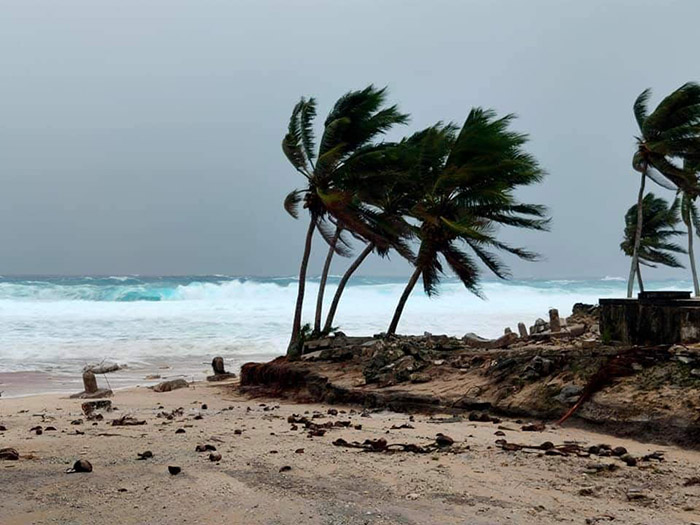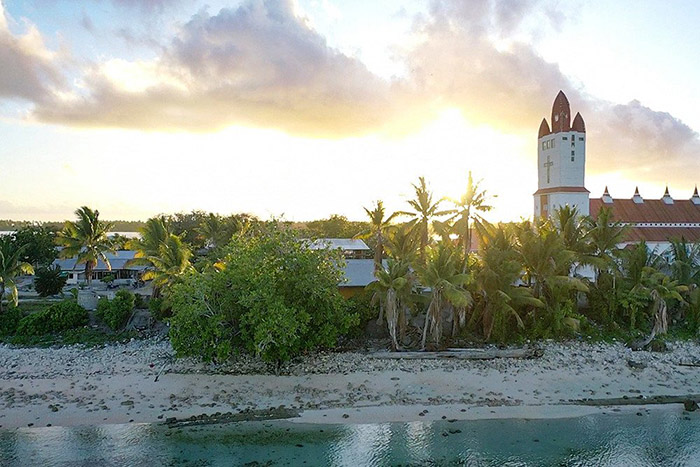
Photo: Lisepa Paeniu is one of the Tuvalu Coastal Adaptation Project (TCAP) scholarship students.
Since 2021, 32-year-old Lisepa Paeniu has been among five students supported by the Tuvalu Coastal Adaptation Project scholarship to pioneer climate action among youths. She is a youth leader, and the only female and second Tuvaluan to be given a Foreign Fulbright award.
“It really bothered me that we didn’t have a national climate strategy,” Lisepa explained. “Tuvalu needed to be compensated not just for the loss of land because of sea-level rise, but also the loss of traditions and culture. Because what are these without a home?”
In September 2022, Lisepa pursued a master's degree in environmental law at Sydney’s University of New South Wales. Today, she is choosing from among three doctoral scholarships between Australia and New Zealand.
Motivated by a deep interest in the need for local law reforms to better reflect traditional environmental knowledge, she has a passion for climate justice. “I think the best way to improve women’s participation in politics, whether local or national, is through empowering other women,” she said.

Tropical storms and cyclones cause major destruction on Tuvalu's islands. Photo: TCAP/UNDP
“Given the small island communities it is easy to build bridges as well as burn them. The more women acknowledge that they are hindering their own development, the easier it would be to promote and build support groups to campaign for the successful election of women at both local and national level.”
As a government lawyer, and Vice President of her indigenous Nukulaelae youth association in the Nukulaelae community, she is also a legal advisor for her indigenous island community and has drafted by-laws to codify customary environmental laws.
“Entering the workforce for women is not difficult in Tuvalu. It is staying in the workforce, given that women take maternity leave, or leave for their sick children, or care for their elderly parents or cook for church or community commitments. My advice would be, if we want to change the status quo to consider issues women face, then we need to be at those meetings.”
Connected to the sky and sea
In 2015, Tropical Cyclone Pam caused disaster that affected almost half of Tuvalu’s population. The saltwater waves flooded the middle of the mainland island, and it has not been possible to grow many traditional root crops since.
“Being unable to plant food gardens means higher poverty and heavy reliance on imported food. Women become more vulnerable to the negative impacts of climate change in Tuvalu because they have to plan and manage the household food,” Lisepa notes.
“I used to love looking for sugar plantations in the wild as a child. Now, you don’t find sugarcane growing wild. The island has become heavily reliant on imported foods. People are moving away from agriculture because it is unreliable due to drought.”
Her fascination for the Tuvaluan people all motivated her to pursue a future in climate law. “Our people are very closely connected to the land and the sea,” she explains. “We have rich traditional environmental knowledge. It always amazes me that people can look into the sky and know whether to fish or focus on the plantation that day.
“They have a way of reading the sky, the ocean and the current, and have gained wisdom by observing their environment. People know when to fish for particular species based on the moon, when to plant certain crops during which seasons, and how ants and birds give strong wind warning signals.
“My grandmother used to tell me that the best time to catch flying fish was when the sky looked like cracked rocks. I would go down to the sea on days like that and sit on the beach and watch all the fishermen with their boats out in the lagoon catching flying fish, so she was not crazy!”

Church on Nanumea island, Tuvalu, July 2022. Photo: TCAP/UNDP
For the future
Diaspora plays a huge role in assisting people back home, whether it’s through financial means or capacity building but also promoting and preserving culture, customs and traditions through dance, song and music.
“Not everyone in my generation is going to stay here and fight. A lot of us definitely want to move, if home isn’t somewhere we are going to succeed, it is not fair to our generation. Those who have the opportunity to leave, should be able to,” Lisepa added.
However, she maintains close ties with her community, and in 2019 she co-founded a non-government organization, which runs environmental-focused activities for up to 200 children, from quizzes and spelling bees to poetry slams. “For those that never had the opportunity to go to university or study, or get formal qualifications, where would they go and what kind of opportunities would they have?”
Despite traveling and pursuing opportunities abroad, Lisepa credits TCAP with the initial opportunity to pursue her master's degree. “During my studies I really managed to sharpen advocacy skills, and I learned to improve my time management, juggling being a mum and wife while pursuing studies.”
For other young women inspired by her story and the climate justice movement, she has a message: “I would tell them that the one way to be heard is to get into the room. If you’re not welcome to the table, build one yourself. There are always people willing to support you.”
About the Tuvalu Coastal Adaptation Project
With US$36 million financing from the Green Climate Fund and US$2.9 million co-financing from the Government of Tuvalu, the 7-year Tuvalu Coastal Adaptation Project is contributing to strengthening the resilience of one of the world’s most vulnerable countries to climate change and sea-level rise. Implemented by the UN Development Programme in partnership with the Government, the project is improving coastal protection in key locations on the islands of Funafuti, Nanumea and Nanumaga. While new measures will act as a buffer during storms, the project also strives to build the capacity of national and island governments and local communities in adapting to climate change in the longer term. Learn more at TCAP.tv Follow the project on Twitter @TCAP4Tuvalu or on Facebook
Additional photos from the Tuvalu Coastal Adaptation Project also available on Flickr: https://flic.kr/s/aHsm6S2Zkw *Please credit as indicated

